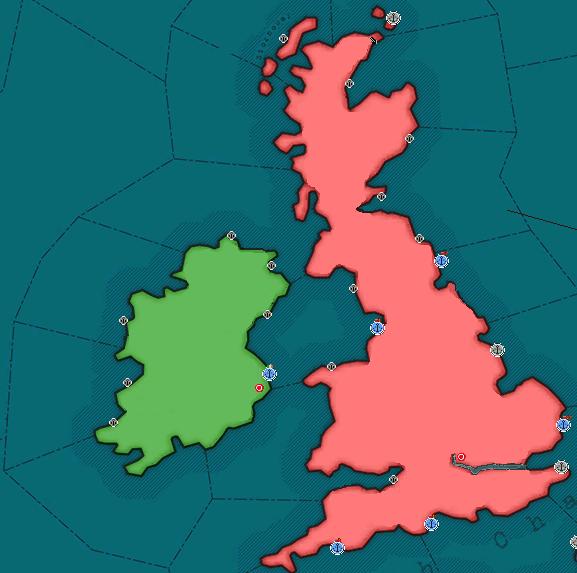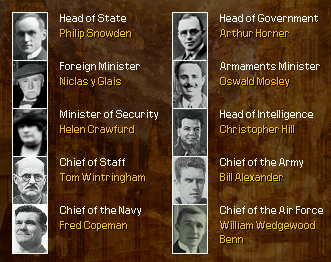Union of Britain
From Kaiserreich
(→History) |
m (Reverted edit of Dinu, changed back to last version by Jamhaw) |
||
| Line 53: | Line 53: | ||
== History == | == History == | ||
| - | After the defeat of France the United | + | After the defeat of France the United Kingdom's war with Germany dragged on inconclusively for two years. In 1921 the stalemate was finally broken when Lloyd-George agreed to General Ludendorf's proposal for a "[[Peace with Honour]]". Under the terms of this treaty it was agreed that Britain would acknowledge Germany's gains from the war, whilst Germany would respect the Imperial possessions of the remaining Entente powers of Britain, Japan and Portugal. However, while Britain's overseas territories remained largely ordered and intact, the faith and support of the people in the Home Islands did not. |
| + | |||
| + | In 1925, disaster struck: a minor labour dispute in the coalfields of South Wales quickly escalated after troops were sent in to restore order. Following the French's example, a General Strike was called by the TUC to cripple the economy. When the government sent orders for the military to quell the unrest, many troops deserted to the side of the strikers, which was accompanied by a major naval mutiny. After six weeks of rioting, looting, and pamphleteering on a massive scale, the Royal Family was evacuated to Canada, followed by most of the country's leading politicians and large property owners. | ||
| + | |||
| + | Following the fall of the British government, a provisional government of revolutionary groups dissolved both Houses of Parliament, and declared that political authority in the "Union of Britain" would pass to a new Congress of Trade Unions. | ||
| + | |||
| + | Following the revolution, 1926 saw the formative Congresses of Socialist Britain, with advocates of various positions coming together to hammer out the framework of the new state. What resulted was a compromise between the factions that enshrined the principals of decentralization, co-operativism, and isolationism. This resulted in the establishment of locally elected councils as the main organ of government (supervised by the national direction of the CTU), a dominant public sector, and a diplomatic stance that emphasized self-defense and national self-reliance above all else. | ||
| + | |||
| + | The British people are currently secure on their island, content to build socialism in political and economic isolation, protected by the strong Republican Air Force and Navy. Additionally, each county is protected by its own popular militia who act both as a reserve military and the police. | ||
== Politics == | == Politics == | ||
Revision as of 14:10, 29 December 2016
| ||||
| Motto Workers of the world, unite! | ||||
| Anthem The Red Flag | ||||

| ||||
|
| ||||
| Official Language | English | |||
| Capital | London | |||
| Chairman of the Congress of Trade Unions | Philip Snowden | |||
| General Secretary | Arthur Horner | |||
| Establishment - Proclaimation of the Union | October 24, 1925 | |||
| Government | Socialist federal republic | |||
| Currency | Pound sterling | |||
| Area | 209,331 km² | |||
| Population | Around 44 million | |||
Union Of Britain is a Socialist state in Western Europe. It is located on the larger of the British Isles.
Contents |
History
After the defeat of France the United Kingdom's war with Germany dragged on inconclusively for two years. In 1921 the stalemate was finally broken when Lloyd-George agreed to General Ludendorf's proposal for a "Peace with Honour". Under the terms of this treaty it was agreed that Britain would acknowledge Germany's gains from the war, whilst Germany would respect the Imperial possessions of the remaining Entente powers of Britain, Japan and Portugal. However, while Britain's overseas territories remained largely ordered and intact, the faith and support of the people in the Home Islands did not.
In 1925, disaster struck: a minor labour dispute in the coalfields of South Wales quickly escalated after troops were sent in to restore order. Following the French's example, a General Strike was called by the TUC to cripple the economy. When the government sent orders for the military to quell the unrest, many troops deserted to the side of the strikers, which was accompanied by a major naval mutiny. After six weeks of rioting, looting, and pamphleteering on a massive scale, the Royal Family was evacuated to Canada, followed by most of the country's leading politicians and large property owners.
Following the fall of the British government, a provisional government of revolutionary groups dissolved both Houses of Parliament, and declared that political authority in the "Union of Britain" would pass to a new Congress of Trade Unions.
Following the revolution, 1926 saw the formative Congresses of Socialist Britain, with advocates of various positions coming together to hammer out the framework of the new state. What resulted was a compromise between the factions that enshrined the principals of decentralization, co-operativism, and isolationism. This resulted in the establishment of locally elected councils as the main organ of government (supervised by the national direction of the CTU), a dominant public sector, and a diplomatic stance that emphasized self-defense and national self-reliance above all else.
The British people are currently secure on their island, content to build socialism in political and economic isolation, protected by the strong Republican Air Force and Navy. Additionally, each county is protected by its own popular militia who act both as a reserve military and the police.
Politics
|
Chairman of the Congress of Trade Unions: Philip Snowden(Federationist, born 18 July 1864)
General Secretary: Arthur Horner (Federationist, born 5 April 1894)
Commissary for Foreign Affairs: Thomas Evan Nicholas (also called Niclas y Glais, Authonomist, born 6 October 1879)
Commissary for the Exchequer: Oswald Mosley (Maximist, born 16 November 1896)
Commissary for Home Department: Helen Crawfurd (Congregationalist, born 9 November 1877)
Head of the Secret Service Bureau: Christopher Hill (born 2 February 1912)
Chief of General Staff of the Republican Army: Tom Wintringham (born 15 May 1898)
Chief of Republican County Militas: Bill Alexander
Commander-in-Chief of the Republican Navy: Fred Copeman (born in 1907)
Commander-in-Chief of the Republican Air Force: William Wedgwood Benn (born 10 May 1877)
The Union of Britain is a "decentralised" state ruled by directly elected regional councils under the jurisdiction of a national "Congress of Trade Unions" (CTU). Having seen the difficulties apparent in France's attempts at 100% nationalization and collectivization, the current British ethos is not one of an entirely state directed economy - instead the CTU prefers to allow economic freedom at the local level backed up by strong workers' rights, welfare support and a democratization of the workplace in the form of co-operatives (both the Private and Public company are banned as forms of business organization). Major industrial concerns are nationalized and run by their respective Trade Unions with supervision from the Congress.
The chairman of the CTU is the nominal head of state, but the government is generally seen by British citizens as a collective entity - decisions are made by voting for a simple majority and all Unions are committed to respecting the majority ruling. Representatives are elected to the CTU by direct elections standing as nominally "independent" candidates, though in practice most coalesce in groups around certain ideals (political parties are banned as formal organizations).
Factions
While political parties do not exist in the formal sense, there are four factions who offer different economic and political approaches to the Union of Britain's goals.
The Federationists believe in maintaining the status quo of the Union of Britain's government, and oppose any attempt to change it. Currently, the Federationists guide the Union of Britain's policies, and are led by Arthur Horner and Philip Snowden
The Congregationalists are a feminist oriented group, headed by Annie Kennedy. Economically they are similar to the Federationists, but believe the path to socialism must be quickened. They are much more rigidly anti-war and isolationist than the other factions.
The Authonomists believe in further decentralizing the the Union of Britain, arguing for the home nations to have greater autonomy. They are led by the Welsh Poet Niclas y Glais.
The Maximists favor an approach similar to the Commune of France's current situation- a strong central government and full state control of the economy. The Maximists are also much more in favour of military action than the other factions and support British nationalism. They are led by Oswald Mosley who is also proposing a new doctrine called Totalism.
Military
The military doctrine of the Union of Britain puts great emphasis on naval superiority in home waters as well as providing escorts for commerce vessels which are the lifeline of the island nations. The army has a secondary role as the air force and the navy are thought to have a higher priority.
Army
The British Army is a mix of standing army units, home defense garrisons and local militias which provide a mobile reserve for the home defense garrisons. The standing army is rather small, but the manpower pool of Britain is great and a great number of divisions can be raised in a relatively short time should the need arise.
Navy
Despite the loss of many ships of the Royal Navy as the monarchists left for Canada, the Republican Navy is still one of the greatest navies of the world and one of the few navies of the world that employ aircraft carriers. The Republican Navy is the sole navy in Europe that can hope to take on the Kaiserliche Marine at sea. The Republican Navy, which is self-governing and largely self-financing, controls not only maritime defence, customs and the merchant marine, but also has a huge influence over shipbuilding, trade and foreign policy.
Air Force
The Republican Air Force is mainly tasked to defend the British airspace and not so much on fighting an aerial war in enemy skies. Still, the RAF does employ a significant number of strategic bombers under the RAF Strategic Bomber Command should the need arise to take the war to the enemy.
Foreign relations
The Union of Britain is mostly isolated from foreign affairs, emphasizing domestic affairs over foreign ones. While they maintain warm relations with the Commune of France, the Socialist Republic of Italy, and other revolutionary countries, the Union of Britain is not a member of any military alliances, including the one led by the Commune of France.
The Union of Britain has poor relations with all members of the Entente, most particularly exiled government in power in Canada.
The extent in which the Union of Britain involves itself in international politics will be a hotly contested issue in the upcoming Congress of the Trade Unions.
Culture
Many British painters and authors were either killed or fled the country with the government in the revolution,although some Intelligentsia like Enid Bylton and Eric Arthur Blair worked to galvanise popular support for the revolution and later the government. Many critics complain of the rigid censorship enforced by Blair's Ministry of Truth in Art, which zealously works to "defend the glories of the Revolution, from the the ever-present dangers of nostalgia and tradition" and consequently he has seen to the destruction of many works of pre-revolutionary art, arguing that "these so called 'masterpieces' say nothing to the Modern Unionist Man, but dark lies, art merely reinforces the power of the elites and if we are ever to throw of the shackles of their generations of oppression we need to eradicate the tools of their oppression, once and for all" (his ministry has also been accused of seeking to re-write the past). Most artistic experts agree that British art is sterile and lifeless entirely committed to the (frequently changing) official forms.


